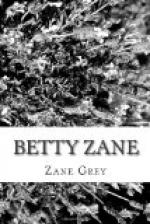The tall form of the Seneca chief moved from among the warriors and with slow and measured tread approached the maiden. His bearing fitted the leader of five nations of Indians. It was of one who knew that he was the wisest of chiefs, the hero of a hundred battles. Who dared beard him in his den? Who dared defy the greatest power in all Indian tribes? When he stood before the maiden he folded his arms and waited for her to speak.
“Myeerah claims the White Eagle,” she said.
Cornplanter did not answer at once. He had never seek Myeerah, though he had heard many stories of her loveliness. Now he was face to face with the Indian Princess whose fame had been the theme of many an Indian romance, and whose beauty had been sung of in many an Indian song. The beautiful girl stood erect and fearless. Her disordered garments, torn and bedraggled and stained from the long ride, ill-concealed the grace of her form. Her hair rippled from the uncovered head and fell in dusky splendor over her shoulders; her dark eyes shone with a stern and steady fire: her bosom swelled with each deep breath. She was the daughter of great chiefs; she looked the embodiment of savage love.
“The Huron squaw is brave,” said Cornplanter. “By what right does she come to free my captive?”
“He is an adopted Wyandot.”
“Why does the paleface hide like a fox near the camp of Cornplanter?”
“He ran away. He lost the trail to the Fort on the river.”
“Cornplanter takes prisoners to kill; not to free.”
“If you will not give him up Myeerah will take him,” she answered, pointing to the long line of mounted warriors. “And should harm befall Tarhe’s daughter it will be avenged.”
Cornplanter looked at Thundercloud. Well he knew that chief’s prowess in the field. He ran his eyes over the silent, watching Hurons, and then back to the sombre face of their leader. Thundercloud sat rigid upon his stallion; his head held high; every muscle tense and strong for instant action. He was ready and eager for the fray. He, and every one of his warriors, would fight like a thousand tigers for their Princess—the pride of the proud race of Wyandots. Cornplanter saw this and he felt that on the eve of important marches he dared not sacrifice one of his braves for any reason, much less a worthless pale face; and yet to let the prisoner go galled the haughty spirit of the Seneca chief.
“The Long Knife is not worth the life of one of my dogs,” he said, with scorn in his deep voice. “If Cornplanter willed he could drive the Hurons before him like leaves before the storm. Let Myeerah take the pale face back to her wigwam and there feed him and make a squaw of him. When he stings like a snake in the grass remember the chief’s words. Cornplanter turns on his heel from the Huron maiden who forgets her blood.”
* * * * * * * * * * * * * * * *
When the sun reached its zenith it shone down upon a long line of mounted Indians riding single file along the narrow trail and like a huge serpent winding through the forest and over the plain.




